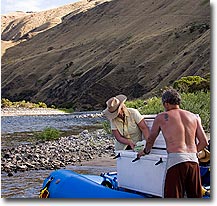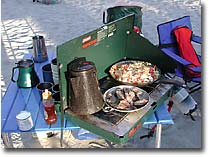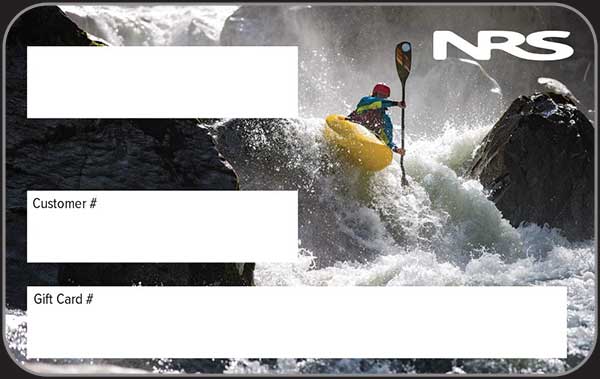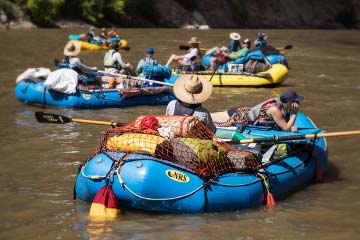The Camp Kitchen
Whatever type of craft you use—kayak, canoe, raft or cataraft—your top kitchen priorities are food packaging and storage, water storage and sanitizing, camp sanitation, food preparation, fire management and waste disposal. The main difference between the various types of crafts is the cargo capacity available.
Food Packaging and Storage
 “Pack It In, Pack It Out” is an important aspect of Leave No Trace® . Opens a new window. camping. Minimize the garbage you have to pack out by eliminating as much of the food packaging before the trip as you can. Dry mixes can be transferred to plastic bags, along with the cooking instructions. Often mixing can be done right in the bag, saving cleanup of a separate container. Also, transfer foods from glass containers to plastic.
“Pack It In, Pack It Out” is an important aspect of Leave No Trace® . Opens a new window. camping. Minimize the garbage you have to pack out by eliminating as much of the food packaging before the trip as you can. Dry mixes can be transferred to plastic bags, along with the cooking instructions. Often mixing can be done right in the bag, saving cleanup of a separate container. Also, transfer foods from glass containers to plastic.
“Wet Happens”, don’t count on dry boxes, dry bags and hatch compartments to keep water out: bag critical dry ingredients in plastic bags or containers. Ziploc® freezer bags are great and come in sizes up to two-gallons.
Keep cold foods cold, at or below 40°F. Bring separate coolers for food and beverages. The beverage cooler will be opened more often, so use a separate for food.
Water Storage and Sanitizing
Make sure water storage containers are clean; sanitize between uses with a dilute bleach solution. Be sure to cap containers tightly during transport to prevent contamination.
Many of the waters we boat on aren’t safe for drinking or for use in cooking without treatment. Of course, it’s safest to bring clean water with you, but that’s not always possible due to its bulk and weight. Here are some guidelines for treating outdoor water sources:
- Treat the cleanest water available. Avoid water from eddies or still pools. Allow cloudy water to settle and decant the cleared water for treatment.
-
Boiling water is an excellent treatment method, since it will kill bacteria, parasites and viruses. Its main drawbacks are the amount of fuel it takes and the time. Boil water vigorously for at least one minute and let cool to room temperature. At elevations above 6,500 ft, increase boiling time to three minutes.
- Water filters having a pore size of 1.0 micron (micrometer) or smaller will effectively remove bacteria and parasites. Viruses are not removed by filtration; where viruses are a concern use chemical treatment after filtration.
- Chemical treatment, using iodine, chlorine or chlorine dioxide can also be effective. Tablets and liquids are commercially available. Some common disease causing organisms are not reliably killed by this method alone and temperature and cloudiness of the water being treated affect treatment efficiency, so follow manufacturer recommendations carefully.
Camp Sanitation
Practicing good sanitation in camp protects you and your fellow boaters. Wash your hands after using the toilet and before and after handling food. Good ol’ fashioned soap and water is most effective when hands are visibly dirty and soiled. Rub the hands together with soap and water for at least 30 seconds, rinse with fresh water. When water’s not available or between washings with soap and water, alcohol gel hand sanitizers can help prevent contamination.
 Effective dishwashing when boating is important. The four-basin technique is tried and true. The first basin of hot water serves as a pre-wash to remove food deposits, the second basin holds hot, soapy water for scrubbing, the third hot-water basin serves as the first rinse, the fourth basin contains a solution of 1 ½ teaspoons of household bleach per gallon of cool water. Leave the dishes in the bleach water for a minimum of a minute. Wipe a table surface off with the bleach water and place the sanitized dishes to air dry.
Effective dishwashing when boating is important. The four-basin technique is tried and true. The first basin of hot water serves as a pre-wash to remove food deposits, the second basin holds hot, soapy water for scrubbing, the third hot-water basin serves as the first rinse, the fourth basin contains a solution of 1 ½ teaspoons of household bleach per gallon of cool water. Leave the dishes in the bleach water for a minimum of a minute. Wipe a table surface off with the bleach water and place the sanitized dishes to air dry.
Food Preparation
Nothing facilitates food preparation like a table. It lets you stand while cooking and gives you a level work surface. The Roll-A-Table is a jewel for boaters. Compacted for transport, it rolls to a mere 5 ½ inches in diameter; when fully set-up it gives you a 32-inch square tabletop and only weighs 10 pounds.
Again, hand washing is essential for those doing food prep. After processing raw meat and poultry, wash hands thoroughly and clean contaminated work surfaces and utensils with a dilute bleach solution.
Fire Management
Where fires are allowed, use them responsibly. Follow all applicable regulations for building and managing fires. Collect only downed and drift wood. Use a firepan or fire blanket, not a rock fire ring. Pack out your ashes.
Waste Disposal
Carry out all garbage and waste products. When fires are allowed, paper items can be burned to reduce waste volume. Strain dishwashing water and put food scraps in the garbage. All water containing soap should be spread at least 200 feet from any water source.
Solid human waste should also be carried out. Consult local regulations for acceptable toilet systems and waste disposal methods. Regulation and conventions regarding urine disposal vary in different regions, check first for your locale.
 NRS Gift Card: Always Fits, Always Wanted
NRS Gift Card: Always Fits, Always Wanted




